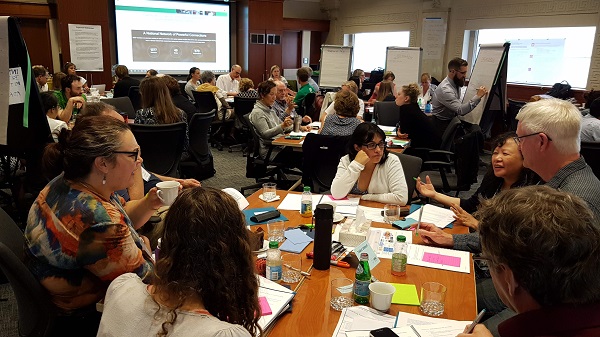News /
The Challenge Dialogue Workshop

Climate Adaptation
By Robin Cox.
On June 11, 2019, the ResilienceByDesign (RbD) Research Lab’s Adaptation Learning Network (ALN) initiative, funded by Natural Resources Canada and BC Climate Action Secretariat, launched its stakeholder engagement workshop. The ALN workshop in Vancouver brought together over 50 climate change adaptation influencers from across BC, including climate adaptation experts, professionals working in a range of disciplines (i.e., engineers, landscape architects, municipal planners, foresters, biologists, agrologists and technicians) and representatives from seven BC post-secondary institutions. The goal of the multi-year project is to build capacity for climate adaptation in BC through professional development and knowledge mobilization. Workshop participants collaborated with the RbD team to identify priorities for 15 new not-for-credit courses to be offered province-wide through the Continuing Studies departments of the participating post-secondary institutions.
Members of the RbD team recently returned from the 4th European Climate Changes Adaptation Conference, ECCA 2019, which hosted more than 1100 participants from 50 countries in dialogue and presentations about the climate crises. The size and diversity of the conference speak to the urgency of the issue and the need for research and action to simultaneously reduce carbon emissions, adapt to the changes already underway, and engage in future thinking in order to prepare for and mitigate the potentially catastrophic changes to come.
Adaptation Learning Network is responding to the reality that the climate crisis affects all sectors of society. It is informed by international, national, provincial, and municipal policy frameworks and actions all focused on reducing disaster and climate risks and vulnerabilities. The collaboration of post-secondary institutions, led by Royal Roads University, is utilizing the human and social capital building potential of educational institutions. The project hopes to contribute to our shared resilience by heightening awareness; increasing the use of climate-informed risk assessments, planning and decision-making processes; contributing to the design and implementation of low-carbon resilience-building strategies; and improved information and knowledge sharing. With our partners and funders, we hope to increase our collective resilience in the face of this daunting and complex emergency.
